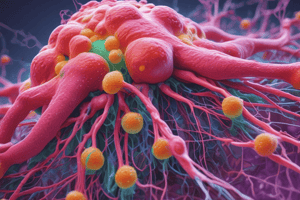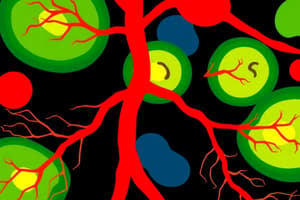Podcast
Questions and Answers
What is the main function of the lymphatic system in the body?
What is the main function of the lymphatic system in the body?
- Producing antibodies
- Draining fluid from tissues and filtering out foreign particles (correct)
- Breaking down food molecules
- Transporting oxygen to tissues
Which type of cells play a significant role in immune function by producing antibodies against specific antigens?
Which type of cells play a significant role in immune function by producing antibodies against specific antigens?
- Platelets
- Red blood cells
- T lymphocytes
- B lymphocytes (correct)
What is the role of T lymphocytes in the immune system?
What is the role of T lymphocytes in the immune system?
- Attack infected cells (correct)
- Regulate inflammation
- Produce antibodies
- Filter out foreign particles
Which part of a virus or bacterium triggers an immune response?
Which part of a virus or bacterium triggers an immune response?
What is the primary function of lymph nodes in the lymphatic system?
What is the primary function of lymph nodes in the lymphatic system?
How do lymphocytes help in immune responses?
How do lymphocytes help in immune responses?
What is one of the essential functions of the lymphatic system mentioned in the text?
What is one of the essential functions of the lymphatic system mentioned in the text?
How does the lymphatic system support the immune system according to the text?
How does the lymphatic system support the immune system according to the text?
Why do lymph nodes increase in size when there is an increased need for filtration?
Why do lymph nodes increase in size when there is an increased need for filtration?
What is the primary function of lymph nodes in the body?
What is the primary function of lymph nodes in the body?
How do axillary lymph nodes differ from mediastinal lymph nodes?
How do axillary lymph nodes differ from mediastinal lymph nodes?
Why is understanding the importance of the lymphatic system crucial for maintaining good health?
Why is understanding the importance of the lymphatic system crucial for maintaining good health?
Flashcards are hidden until you start studying
Study Notes
Lymphatic System Overview
The lymphatic system is a critical part of our body's defense against disease. It comprises a network of vessels, glands, ducts, and organs that work together to drain fluid from tissues back into blood circulation while filtering out foreign particles such as bacteria, viruses, and cancerous cells. This system plays a vital role in immune responses and overall health maintenance.
Immune Response and the Lymphatic System
Immunity refers to the ability of the body to fight off invading organisms, including those that cause infection. When harmful microbes enter your body through the skin, respiratory tract, or digestive system, they trigger an immune reaction that helps keep you healthy. The lymphatic system supports this process by allowing white blood cells called lymphocytes to circulate throughout the body and destroy pathogens. Most germs are killed before they can make you sick; however, some do get past these defenses, causing illness.
Lymphocytes play a significant role in immune function. There are two main types of lymphocytes: B lymphocytes produce antibodies against specific antigens (the parts of a virus or bacterium that trigger an immune response), and T lymphocytes directly attack infected cells. These cells also help regulate other aspects of immunity, such as inflammation and tissue repair. They even have the power to recognize certain cancer cells and eliminate them.
Functions of the Lymphatic System
In addition to supporting the immune system, the lymphatic system has several essential jobs:
- Helping absorb fats during digestion by delivering fatty acids to the liver via the thoracic duct.
- Aiding metabolism by returning nutrient-rich fluids to the cardiovascular system after they’ve been filtered out of tissues.
- Acting as a highway for waste removal, carrying cellular debris like dead cells away with it.
This system also serves as a reservoir for various proteins, hormones, and enzymes. As these chemicals flow through the lymphatic capillaries, they interact with immune cells, keeping them active. In turn, these cells release more proteins and cytokines that help control how other immune cells respond to invaders. Without this interplay, the entire immune system would deteriorate rapidly.
Lymph Nodes and Their Importance
The primary exchange point between the bloodstream and lymphatic system is known as a lymph node. Located near internal organs, each type of lymph node filters different sorts of materials. For example, axillary lymph nodes close to armpits filter sweat due to their proximity to the skin, whereas mediastinal lymph nodes near heart and lungs capture airborne material through their connections with the bronchus tree. About 70% of all infections first manifest themselves in lymph nodes because they serve as the first line of defense when foreign matter enters the body.
One important thing to remember about lymph nodes is that they increase in size whenever there is an increased need for filtration — thus swelling up if something goes wrong. If your tonsils become infected, for instance, nearby lymph nodes might grow larger temporarily to handle excess load caused by the infection. Once the problem clears up, though, the lymph nodes shrink down again.
Understanding the importance of the lymphatic system is crucial for maintaining good health. By supporting the immune system and facilitating communication among its components, the lymphatic system ensures we remain protected from diseases. Its function as a highway for waste removal and nutrients means it contributes significantly to proper bodily functioning.
Studying That Suits You
Use AI to generate personalized quizzes and flashcards to suit your learning preferences.




